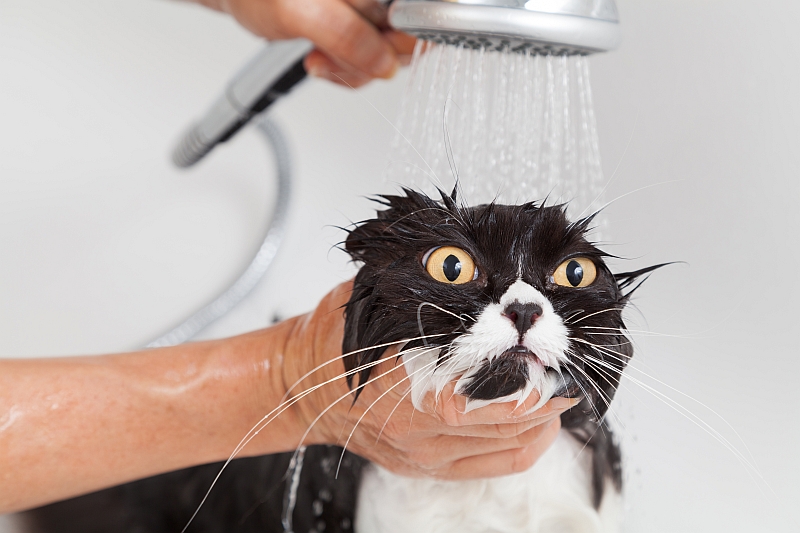There are many theories about why cats dislike water, but there is no definitive answer to the question. The theories are based on reasonable assumptions; however, there is no conclusive answer. So what are some of the explanations for the aversion cats show towards water?
Genetics & Instinct: The ancestors of the domesticated cat lived in mostly dry regions of Africa, and did not have much exposure to water or the need to swim. Their aversion to water is simply an inherited trait.
It Makes Them Cold: Cats heavy coat which has, as one of its functions, the job of keeping body heat from dissipating. When they get drenched, they lose the ability to retain as much heat as when they are dry. The cat has a relatively non-oily fur, and the dense double-layered coat takes a long time to dry, which make them unable to retain body heat for an extended period.
Disruption of Sensors: Cats’ fur is a sensory organ, which can pick up minute vibrations in the air. This ability is used to identify other animals nearby. Additionally, this sensing ability contributes to their balance. Since the cat’s dense coat takes a long time to dry out, the loss or reduction in sensitivity makes them feel uncomfortable.
Chemical Odors: Cats are highly sensitive to odors, and they may have an aversion to being completely wet because they can smell the chemicals (i.e. chlorine, fluoride) from municipal water sources.
Reduction of Agility: Cats have a dense coat, which can become quite heavy if drenched. The additional weight of the wet coat reduces the cat’s ability to move about in an agile manner, as it is normally used to doing. This reduction in agility makes the cat uncomfortable.
Is Bathing Your Cat a Problem?
The question of why cats hate water usually comes up when owners try to bathe their cat, and realize that she really is not fond of being drenched, or soaked in a bath. There are a couple of things to keep in mind.
- Cats have to be acclimated in order to warm up to water, and to being wet.
- It should not be a big worry if your kitten, or young cat does not let you give her a bath. Cats are constantly cleaning themselves—some estimates note that they spend up to 40% of their time grooming—so you may never have the need to bathe your cat.
How to Reduce Your Cat’s Aversion to Water?
If you find yourself in a situation that requires your cat to have baths (i.e. if your cat has gotten into some sort of sticky mess, or is too old to properly groom herself), you can take baby steps in getting her to warm up to the idea of being given a bath.
- Ideally, you should start bathing her when she is a kitten so that she will get used to water. The younger she is introduced to water, the better the chance of her liking water when she is older.
- Before you dunk her in a tub/sink full of water, get her used to the idea of being around water by filling the sink with an inch or two of water, and get her to play with, and in the water, by putting a few interesting toys in the water for her to play with.
- Once she is comfortable with playing in a shallow pool, gradually increase the depth of water, until she is comfortable being a neck deep water.
- Lay down a thick towel on the bottom of the sink/tub so your cat can sink her claws into it, and feel a bit more grounded.
Never force your cat into water or restrain her in order to drench her in water, and when you do give her a bath, try to finish the job as quickly as possible so there is little chance of her getting nervous and try to escape.

